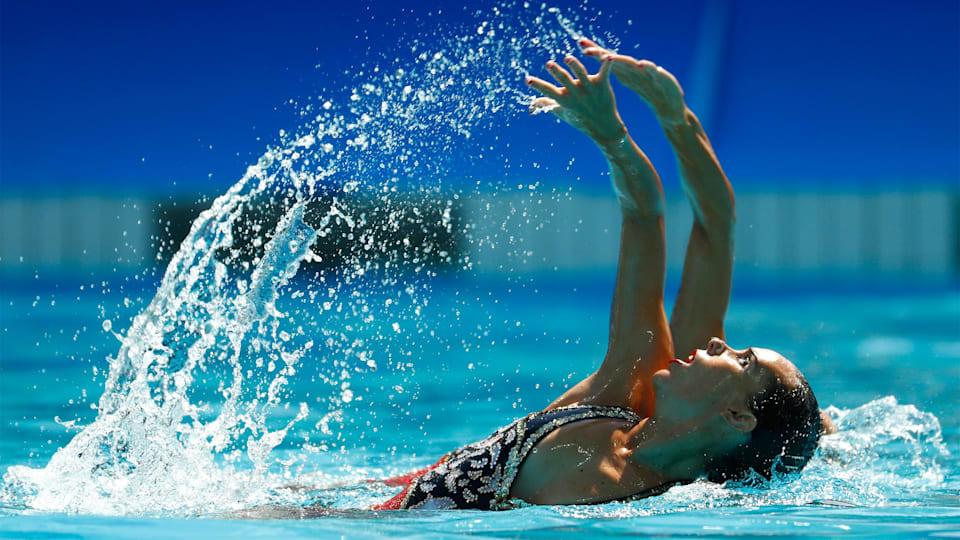Artistic swimming legend Ona Carbonell finds the positive in Tokyo 2020 decision
After starring in the two most recent Games, Ona Carbonell knows all too well the frustration and disappointment many of her peers will be feeling now. But the two-time Olympic medallist is certain the right option has been taken and that good things will come as a result, perhaps even her own return to the pool.

“I want to send a message of support to all the athletes preparing for the Tokyo 2020 Olympic Games,” said Ona Carbonell, the woman with more International Swimming Federation (FINA) World Championship medals to her name than any other in history.
Pregnant with her first child, Carbonell knew several months ago that she would not be competing at Tokyo 2020. That was a tough enough reality to face, but she knows it is nothing compared to the mental challenges athletes all over the world are facing right now because of the COVID-19 pandemic. The Spanish star, however, is adamant that, together, the sports world will emerge all the stronger.
“It is a very, very hard situation and I am with everyone because I know it is very difficult,” the London 2012 women’s duet silver medal winner and team bronze medallist said. “But I think it is a good option for all athletes, Spanish and from all over the world, to be able to prepare well in order to show up for this very important event in the best shape possible.
“Take heart, everyone. We are here for whatever you need.”
It is a heart-warming message, but the stark reality, as Carbonell points out, is that “we have to prioritise social well-being, health and what the world health bodies say”. She revealed that her team-mates are “training however they can by Skype” but acknowledged that, of course, there is no replacement for a swimming pool in her sport.
Carbonell is due to give birth later this year and, while Tokyo 2020’s 12-month delay is unlikely to give her enough time to win a place in the competitive Spanish squad at the Games, she does have some great news for fans of artistic swimming.
“My idea and my wish after giving birth would be to return to the sport,” Carbonell said. “I believe that sport is lacking some help for female athletes. For example, there are many more sportsmen who are fathers than sportswomen who are mothers, but I believe that it can be done, and I want to demonstrate that it is possible. I would be delighted to be able to do it.”
Just nine months ago, Carbonell showed she remains one of the very best out there. The 29-year-old won her record-breaking 23rd FINA World Championship medal in the Republic of Korea in July 2019. Among them was the solo technical silver, which she took with a mesmerising display set to a montage of Nelson Mandela’s words.
Not only did the medal underline her continued competitiveness on the world stage, but it also reaffirmed her love for a discipline that has consumed her for as long as she can remember.
“It’s a very complete sport that requires many different things – technique, precision, flexibility, speed, interpretation, and heart and lung capacity, all in a medium to which we are not accustomed,” Carbonell said. “I am very motivated knowing that my way of interpreting will thrill the public and the judges. The mixture of art and sport seems to me to be incredible, together with the water, which has always been my world and always will be.”
To hear Carbonell talk about artistic swimming is to get a real understanding of a discipline that can be hard to interpret for the uninitiated.
“We would say that, in the water, our world is almost more real in reverse,” Carbonell said. “That is to say, we spend a great deal of time every day weightless, almost more hours weightless than under the influence of gravity.
“In these times of weightlessness, we spend a lot of time upside down, and we understand perfectly where left, right, up and down are situated. And we have a visual and sound perception with our bodies spinning upside down in the water. We always have points in the swimming pool, which you make into reference points, especially when you have to turn, or when you are very close as a team or doing acrobatics.”
Such poetry takes serious work. Four years of training 10 hours a day, 6 days a week to reach the Olympic Games in the best condition possible, according to Carbonell. It is no wonder that she rates her silver and bronze at London 2012 as her “greatest triumphs”.
“It’s magic, very, very special,” the Barcelona resident said of the Olympic Games. “Above all, it signifies a deep, personal knowledge that all the work, the effort, was worth it. And to be able to share these magic moments with athletes from different countries, of different ages and ideologies, for me this is wonderful.”
But, despite her clear and overriding passion for artistic swimming, Carbonell is not blinkered. First and foremost, it is the power of sport of any kind that she believes in, particularly at this challenging time.
“Sport in general, whatever it is, will teach you values that will be with you all your life,” she said. “I would not know who I am without sport and all that I have learned about being human.”
